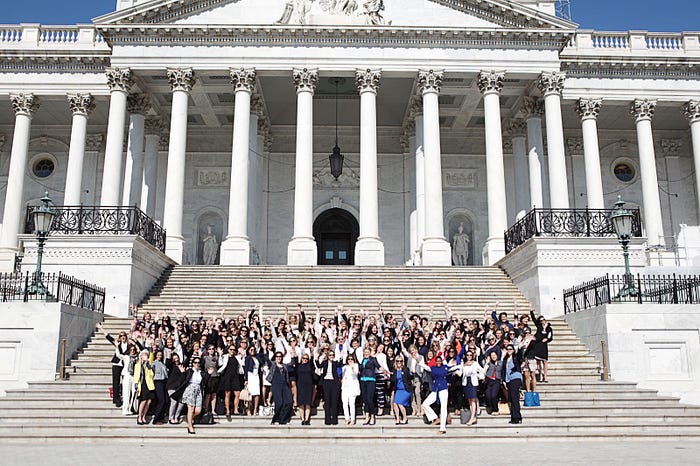4 Lessons From Successful B Corps
How to Balance Profit and Purpose, From Those Doing It Well

For the business world to embrace a new vision of success, leaders have to show the way by balancing purpose and profit.
Through their positive social and environmental impact, Certified B Corporations are working to build an economy that works for everyone, in the long term. Through this global movement, companies of all sizes are creating meaningful work and inclusive workplaces.
Read on for examples from four B Corps that are making good on their aspirations to use business as a force for good.

Build your mission into your company’s DNA.
Since its founding in 1991, New Belgium Brewing has used its ever-growing platform as a force for good. The company, which is the fourth-largest craft brewery in the United States, has been wildly successful in these pursuits. It was named a Best For The World honoree by B Lab four years in a row and sold nearly a million barrels of beer in 2017. The company’s sudsy offerings are sold in all 50 states, plus a handful of other locations around the world.
In 2018, New Belgium took the plunge to benefit corporation status, ingraining its commitment to bettering the company and the world in its legal framework. Thanks in large part to efforts from COO Joe Davis, the craft brewer now joins the ranks of almost 7,000 other benefit corporations around the world. The move comes four years after Colorado became a legal jurisdiction for benefit corporations. (Learn more about passing benefit corporation legislation in your state.)
Essentially, benefit corporation legal status holds New Belgium and other similarly motivated corporations legally accountable to act with integrity and transparency. The benefit corporation, according to the nonprofit B Lab, is “a new legal tool to create a solid foundation for long-term mission alignment and value creation. It protects mission through capital raises and leadership changes, creates more flexibility when evaluating potential sale and liquidity options, and prepares businesses to lead a mission-driven life post-IPO.”
“Benefit corporations retain all the virtues of the corporation as a capital-raising form, but purge it of the worst excesses of 20th-century practices that valued profits over people, place and our shared future,” says Holly Ensign-Barstow, who works in mission alignment and policy at the nonprofit B Lab. “They integrate their mission into their legal DNA.”

Speak up for what you believe in.
The iconic environment-first outdoor-clothing brand Patagonia is probably as well known for its styles and products as it is for taking stances on issues it believes in. In the last two years, Patagonia has launched multiple campaigns, including heading public efforts to save Bears Ears, bringing attention to preserving wild spaces and national parks, spearheading the Time to Vote effort, dedicating its $10 million tax cut to environmental causes, and creating Patagonia Action Works, a citizen-activism site for local groups across the U.S. Patagonia is a longtime donation partner of 1% for the Planet and has given more than $100 million to environmental nonprofits since the company was founded.
That’s not just good marketing — although, in the company’s experience, it most definitely is — it’s what dusting off the company’s mission statement and bringing it to life looks like, something any brand could aim to replicate.
Patagonia is in business to save our home planet, and the alignment of the company’s mission with its public outreach and activism has helped it continue to grow. Patagonia is a global apparel brand with roughly $1 billion in annual revenue and considerable environmental street cred. Since 1985, Patagonia has donated more than $100 million to environmental work. That’s not a bad score, and when you combine it with all the company’s non-cash environmental activity — like the nearly 3 million public comments regarding the importance of public lands — it’s easy to imagine how this might have a systemic effect on environmental preservation.
Much of Patagonia’s environmental credibility comes from this involvement with grassroots organizations, and in particular the cash donations, as they prove that the company was willing to put its money where its mouth was.
Empower other companies to grow the movement.
The Business Development Bank of Canada (BDC) is devoted to Canada’s entrepreneurs. The B Corp bank provides loans, investments and advisory services. For BDC, supporting B Corps flows from this purpose and is a sure investment, according to Craig Ryan, BDC’s director of social entrepreneurship.
Ryan shares the reasons why: “One, we see innovation. They’ve taken a proven model — the corporation — and tweaked it to solve a stubborn problem: prosperity that doesn’t include enough people and that isn’t always environmentally sustainable.
“Two, we see rigour. The B Corp certification assessment is comprehensive and bracing. A poorly managed company won’t pass. B Corp companies are well-managed companies.
“Three, we see success. We see that B Corp companies are as profitable and resilient as traditional companies. Repeat: They’re as solid as traditional companies.
“Finally, we see that becoming a B Corp brings advantages: brand identity differentiation, powerful social media appeal, lineups of potential millennial employees and membership in a club whose members seek to do business with each other.”
For these reasons, BDC has provided more than $120 million in financing for B Corps and other social-purpose companies. Additionally, it has invested $1.5 million in grassroots organizations and initiatives that support social-purpose entrepreneurs across Canada.
“We work to raise awareness of the certification and the movement in every part of the country, from Pacific to Atlantic, attracting several thousand entrepreneurs and their peers to about a hundred events a year,” Ryan says. “We also collaborate with municipal governments to guide entrepreneurs to and through the B Corp assessment — notably in Vancouver and Toronto. Finally, we host or sponsor monthly meetings of B Corp entrepreneurs and employees across Canada.
“We also talk a lot about B Corps on social media — where, strikingly, it is BDC’s most popular topic.”

Create employee and consumer advocates for your mission.
Everyone has the potential to be an agent of change. That tenet of civic engagement was not lost on B Corp Beautycounter’s founder Gregg Renfrew as she started and built the multichannel company that sells nontoxic beauty products online, in retail stores and through a network of consultants. Renfrew’s vision included making each salesperson an advocate involved in making the industry safer and better.
“By incorporating advocacy and education into the role of a consultant, Beautycounter has also empowered thousands of women across the country and across North America to participate in the democratic process,” says Lindsay Dahl, Beautycounter’s vice president of social and environmental responsibility. “Often, we have heard women say that they did not think they could effect change. Yet democracy only works when everyone participates, and our successes thus far prove this to be true.”
The 130 employees at Beautycounter work with nearly 27,000 consultants in the U.S. and Canada. Consultants sell products through social gatherings, one-on-one meetings and unique codes for online shopping. They can qualify for incentives, such as the opportunity to go to Washington, D.C., with the Beautycounter HQ staff and advocate for better beauty laws.
Over the past few years, Beautycounter clients and consultants have made more than 3,500 calls, sent more than 80,000 emails and attended more than 650 meetings with their members of Congress and members of Parliament in Canada.
B the Change gathers and shares the voices from within the movement of people using business as a force for good and the community of Certified B Corporations. The opinions expressed do not necessarily reflect those of the nonprofit B Lab.


